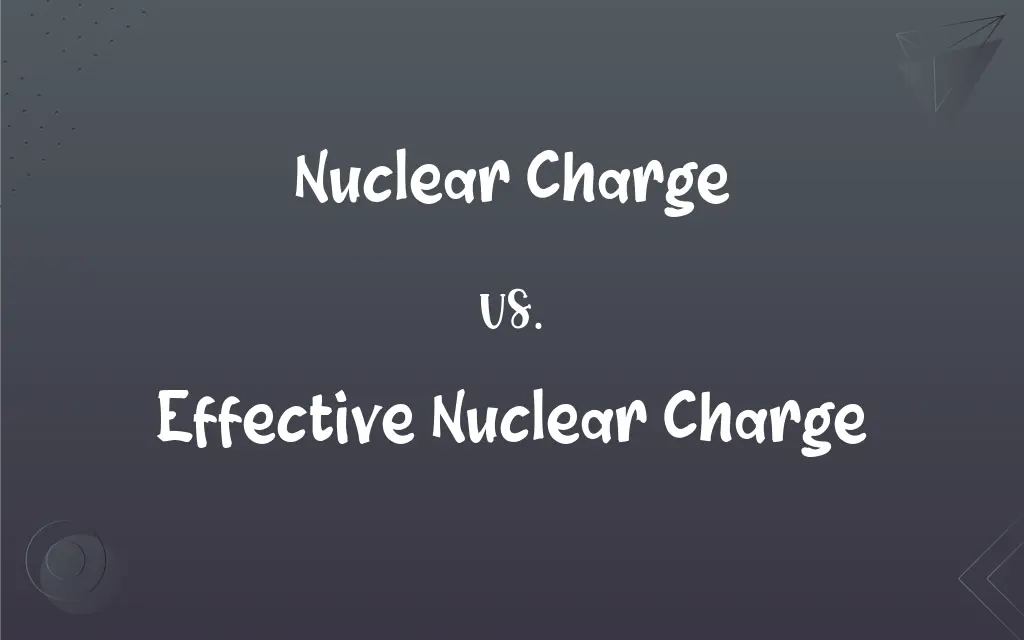Nuclear Charge vs. Effective Nuclear Charge: What's the Difference?
Edited by Aimie Carlson || By Harlon Moss || Published on December 11, 2023
Nuclear charge is the total charge of an atom's nucleus due to protons; effective nuclear charge is the net positive charge experienced by an electron in an atom.

Key Differences
Nuclear charge refers to the total positive charge of an atom's nucleus, determined by the number of protons. Effective nuclear charge, however, is the net positive charge experienced by electrons, reduced by the shielding effect of other electrons.
In nuclear charge, the focus is on the total number of protons in the nucleus. While, effective nuclear charge considers both the nuclear charge and the repulsion from other electrons, resulting in a lower perceived charge by outer electrons.
Nuclear charge remains constant for a given element as it's based on its atomic number. Whereas, effective nuclear charge increases across a period in the periodic table as additional protons exert a stronger pull on electrons.
Nuclear charge is important in determining the element's identity. Meanwhile, effective nuclear charge is crucial in understanding chemical properties like atomic size and ionization energy.
Nuclear charge is a straightforward calculation (number of protons). Effective nuclear charge is more complex, calculated using Slater's rules or other approximations, accounting for electron shielding and penetration.
ADVERTISEMENT
Comparison Chart
Definition
Total positive charge of nucleus (protons)
Net positive charge felt by an electron
Variability
Constant for each element
Varies within an atom due to electron shielding
Calculation
Equal to atomic number
Calculated considering electron shielding
Role in Chemical Properties
Identifies the element
Influences atomic size, ionization energy
Dependence on Electrons
Independent of electron arrangement
Dependent on electron arrangement and shielding
ADVERTISEMENT
Nuclear Charge and Effective Nuclear Charge Definitions
Nuclear Charge
A constant characteristic for each element.
The nuclear charge helps in identifying elements in the periodic table.
Effective Nuclear Charge
Calculated considering electron-electron repulsions.
Effective nuclear charge calculations help in understanding chemical bonding.
Nuclear Charge
A fundamental property affecting atomic structure.
The nuclear charge partly determines the arrangement of electrons.
Effective Nuclear Charge
The net positive charge experienced by an electron in an atom.
Effective nuclear charge explains why valence electrons are held more tightly in fluorine than in lithium.
Nuclear Charge
The total positive charge of an atom's nucleus.
The nuclear charge of helium is +2.
Effective Nuclear Charge
An indicative measure of the hold on valence electrons.
The increase in effective nuclear charge across a period explains increasing ionization energies.
Nuclear Charge
The inherent positive charge within an atom.
Oxygen's nuclear charge influences its chemical reactivity.
Effective Nuclear Charge
A reduced nuclear charge due to electron shielding.
In sodium, the effective nuclear charge felt by outer electrons is less than its actual nuclear charge.
Nuclear Charge
A measure equivalent to the number of protons in the nucleus.
Carbon has a nuclear charge of +6.
Effective Nuclear Charge
A factor influencing atomic size and ionization energy.
Higher effective nuclear charge in chlorine leads to a smaller atomic radius.
FAQs
Does effective nuclear charge vary within an atom?
Yes, effective nuclear charge can vary due to the shielding effect of inner electrons.
How is nuclear charge determined?
Nuclear charge is determined by the number of protons in an atom's nucleus.
What is the primary difference between nuclear charge and effective nuclear charge?
Nuclear charge is the total positive charge of the nucleus, while effective nuclear charge is the net charge felt by an electron after accounting for electron shielding.
What factors affect the effective nuclear charge?
Effective nuclear charge is affected by the number of protons and the electron configuration, specifically the shielding effect of other electrons.
Is nuclear charge the same across isotopes of the same element?
Yes, nuclear charge remains the same across isotopes, as they have the same number of protons.
Does the effective nuclear charge increase across a period?
Yes, effective nuclear charge generally increases across a period due to the increasing number of protons.
What role does electron shielding play in effective nuclear charge?
Electron shielding reduces the effective nuclear charge felt by outer electrons due to repulsion from inner electrons.
Can nuclear charge change for an element?
No, nuclear charge is constant for a given element and equal to its atomic number.
Can effective nuclear charge be directly measured?
Effective nuclear charge is not directly measured but calculated using approximations like Slater's rules.
How does effective nuclear charge affect electron affinity?
Higher effective nuclear charge typically increases electron affinity, as the atom can attract electrons more strongly.
Does effective nuclear charge vary in ions?
Yes, effective nuclear charge can vary in ions due to changes in electron configuration and shielding.
Can nuclear charge be altered artificially?
Nuclear charge cannot be altered without changing the element itself, which would require nuclear reactions.
Why is effective nuclear charge important in chemistry?
It's important because it influences atomic properties like size, ionization energy, and chemical reactivity.
Is nuclear charge affected by chemical reactions?
No, nuclear charge is not affected by chemical reactions as it is a property of the nucleus.
Does nuclear charge influence magnetic properties?
Nuclear charge can influence magnetic properties indirectly through its effect on electron configuration.
How does effective nuclear charge contribute to periodic trends?
It explains trends such as increasing ionization energy and decreasing atomic radius across a period.
How does nuclear charge affect the periodic table?
Nuclear charge determines the position of elements in the periodic table based on the atomic number.
Can elements with the same nuclear charge have different effective nuclear charges?
Elements have unique nuclear charges, but within an element, different electrons can experience varying effective nuclear charges.
How is nuclear charge related to ionization energy?
Higher nuclear charge generally leads to higher ionization energy, as electrons are held more tightly.
Is there a simple formula to calculate effective nuclear charge?
While there's no exact formula, Slater's rules provide a way to estimate effective nuclear charge based on electron configuration.
About Author
Written by
Harlon MossHarlon is a seasoned quality moderator and accomplished content writer for Difference Wiki. An alumnus of the prestigious University of California, he earned his degree in Computer Science. Leveraging his academic background, Harlon brings a meticulous and informed perspective to his work, ensuring content accuracy and excellence.
Edited by
Aimie CarlsonAimie Carlson, holding a master's degree in English literature, is a fervent English language enthusiast. She lends her writing talents to Difference Wiki, a prominent website that specializes in comparisons, offering readers insightful analyses that both captivate and inform.































































